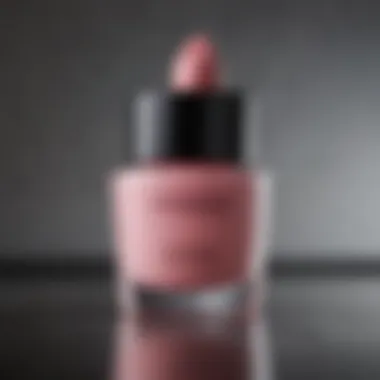Sales Strategies for MAC Cosmetics: Insights and Techniques


Intro
MAC Cosmetics has established itself as a prominent player in the beauty industry. This brand is renowned not only for its diverse product range but also for its dynamic marketing strategies. In an era where consumer preferences shift rapidly, understanding MAC’s approaches to sales can provide valuable insights into effective techniques in the beauty market.
This article aims to dissect various sales methodologies that MAC employs, shedding light on brand positioning, consumer engagement, and digital influences that shape its operational tactics. By analyzing these aspects, professionals and enthusiasts in the beauty sector can gain an appreciation for the elements that contribute to MAC's ongoing success.
Understanding MAC Cosmetics as a Brand
Understanding MAC Cosmetics involves looking at its core elements that define the brand's essence. A strong grasp of the brand helps in visualizing how its sales strategies are formulated to appeal to consumers. The importance of this understanding cannot be overstated, as it informs everything from product offerings to marketing techniques.
Brand History and Evolution
MAC Cosmetics was founded in 1984 by Frank Toskan and Frank Angelo in Toronto. Initially, it served primarily professional makeup artists, but its popularity soon soared beyond that niche. Over the years, MAC evolved by embracing diversity and inclusivity, which became cornerstones of its identity. The brand consistently highlighted a broad range of shades to cater to various skin tones, setting itself apart in an often homogeneous beauty landscape. Today, MAC is recognized globally and remains a leader in the cosmetics industry, operating in over 100 countries. The brand's journey has encapsulated adaptability to consumer needs and a commitment to trendsetting.
Core Values and Mission Statement
At the heart of MAC Cosmetics lies a mission that emphasizes artistry and self-expression. The brand aims to empower individuals through beauty, celebrating diversity in all forms. MAC's core values revolve around quality, innovation, and social responsibility. The company is known for its dedication to being cruelty-free and supporting various charitable causes. This aligns with modern consumers' expectations for brands to be socially aware and ethically responsible. By maintaining these principles, MAC fosters strong emotional connections with its customers.
Target Demographics and Market Positioning
MAC Cosmetics effectively targets a wide demographic, appealing to makeup enthusiasts of various ages and backgrounds. The brand's positioning in the market is quite strategic; it balances between being a luxury beauty brand and an accessible one. MAC appeals to professionals with high-quality products while also catering to everyday consumers through diverse marketing strategies. The focus on both professional and everyday users allows MAC to capture a larger share of the market. This dual targeting is crucial as it creates a broad consumer base that values artistic expression and individualism in beauty.
"Inclusivity has been a driving force for MAC Cosmetics since its inception, impacting sales and brand loyalty."
Sales Techniques Utilized by MAC Cosmetics
Sales techniques play a critical role in the overall success of MAC Cosmetics. The company leverages multiple strategies to engage with its customer base and drive sales. These techniques help to increase brand visibility and enhance consumer experience, ultimately leading to higher revenue. Understanding how these sales techniques function can give valuable insights into effective market strategies that can be applied in various cosmetic sectors.
Direct Selling Strategies
Direct selling is an essential approach for MAC Cosmetics. It enables the brand to build a personal connection with customers. MAC's makeup artists often demonstrate products directly to consumers in stores. This hands-on approach allows customers to engage with the product before purchase, enhancing their buying confidence. Moreover, by training employees extensively on product knowledge, MAC ensures that sales representatives can cater to specific customer needs, thus tailoring their pitch effectively.
- The benefits of direct selling include:
- Increased customer trust: Customers are more likely to purchase products after a personalized consultation.
- Immediate feedback: Direct interaction allows the brand to receive instantaneous reactions to products, aiding in future marketing efforts.
- Enhanced customer experience: A personalized approach often results in higher satisfaction, leading to repeat purchases.
Influencer Collaborations
Influencer collaborations are another key sales technique for MAC Cosmetics. The brand partners with well-known beauty influencers to reach wider audiences. These influencers create content that features MAC products and promote them to their followers. This strategy taps into the authenticity and relatability that influencers offer, making it easier for potential customers to trust recommendations.
- The impact of influencer collaborations includes:
- Broadened target market: MAC is able to engage with younger demographics that follow these influencers.
- Boosted brand credibility: When trusted figures endorse a product, it enhances MAC’s image in the market.
- Increased engagement rates: Such collaborations often lead to higher interactions on social media platforms, making it easier for MAC to communicate with potential customers.
Interactive In-Store Experiences
MAC Cosmetics excels at providing interactive in-store experiences. The company invests in creating vibrant and engaging environments for customers. In-store events, product launches, and makeup classes help to foster a community feel around the brand. Customers can explore products in a hands-on way.
- There are several benefits to these interactive experiences:


- Engagement with the brand: Consumers build a personal connection with MAC through in-store activities.
- Product trial: Customers can try new products before making a purchase, leading to more informed buying decisions.
- Community building: Events encourage customers to interact not only with the brand but with each other, strengthening their loyalty to MAC.
"Interactive experiences not only enhance consumer satisfaction but also contribute positively to the brand's image as approachable and engaging."
These sales techniques each contribute to MAC Cosmetics maintaining its competitive edge in the beauty industry. By incorporating direct selling, influencer collaborations, and interactive in-store experiences, MAC crafts a holistic approach to consumer engagement. This engagement is integral to the brand's ongoing success.
Impact of Digital Marketing on Sales
Digital marketing is a fundamental aspect of MAC Cosmetics' sales strategies. It has reshaped how brands engage with consumers, making it crucial for understanding MAC's position in the market. The rise of digital channels has enabled MAC to reach a wider audience, personalize their messaging, and create a cohesive brand experience across different platforms.
Social Media Engagement
Social media serves as a powerful tool for MAC Cosmetics. Platforms like Instagram, Facebook, and TikTok allow the brand to showcase products visually while tapping into user-generated content. Engaging customers through compelling visuals and interactive content fosters a sense of community around the brand. MAC encourages customers to share their makeup looks using specific hashtags, which not only increases visibility but also builds brand loyalty.
MAC’s strategizing involves collaborating with influencers and beauty experts to expand their reach. Influencers have the ability to sway opinions and drive conversions. As followers see their favorite personalities endorse MAC products, they are more likely to consider purchasing. Additionally, the immediacy of social media means that promotions can be adapted and adjusted in real-time, leading to better engagement rates.
E-Commerce Optimization
The shift towards online shopping has been significant, especially in the wake of global events. For MAC Cosmetics, optimizing their e-commerce platform is essential. A user-friendly website enhances the shopping experience while making it easier for customers to browse and purchase products.
Key aspects of e-commerce optimization include:
- Responsive Design: Ensure the website is effective on mobile devices, catering to consumers who prefer shopping on their phones.
- Product Descriptions and Images: Detailed descriptions and high-quality images of products increase customer confidence and satisfaction.
- Customer Reviews: Users often rely on reviews to make informed decisions. By prominently displaying these, MAC improves trust in their brand.
E-commerce analytics play a role in identifying consumer behavior and preferences. Analyzing shopping data allows MAC to refine their strategies, leading to better product placements and targeted marketing offers.
Email Marketing Campaigns
Email marketing remains a strong channel for direct communication with customers. For MAC Cosmetics, focused email campaigns are a strategic approach to nurture leads and promote ongoing engagement.
Successful email marketing campaigns often feature:
- Personalized Content: Tailoring emails based on consumers' previous purchases or browsing history can increase open and click-through rates.
- Exclusive Offers: Providing special discounts or early access to product launches for subscribers encourages loyalty and repeat purchases.
- Informative Newsletters: Regular updates about new products, beauty tips, or insider stories keep the brand top of mind, building a relationship with the consumer.
In summary, digital marketing impacts MAC Cosmetics' salesforce by enhancing customer interaction and optimizing purchasing pathways. In a world where consumer preferences are continuously evolving, an effective digital marketing strategy is not just an option but a necessity.
"In the digital age, our ability to adapt to consumer behavior dictates our success in the market."
By integrating these strategies, MAC effectively drives sales and builds a robust brand presence in an increasingly competitive beauty industry.
Product Development and Assortment Strategy
The strategy of product development and assortment is critical for MAC Cosmetics. It serves as the backbone for aligning their offerings with consumer desires while maintaining a strong competitive position in the beauty market. Understanding this strategy can reveal how MAC stays relevant and appealing to its audience, especially in an industry marked by ever-changing preferences.
Identifying Consumer Trends
In cosmetics, staying attuned to consumer trends can significantly influence sales. MAC Cosmetics employs extensive market research to track preferences among its diverse customer base. They analyze social media movements, beauty blogs, and influencer feedback for insights.
This active listening enables MAC to shape its product lines that resonate with current beauty ideals. For instance, trends toward inclusivity have driven the introduction of a diverse foundation range, catering to various skin tones. By embracing these trends early, MAC positions itself as an industry leader capable of adapting swiftly.
Limited Edition Releases


Limited edition releases are a powerful tactic in MAC's product strategy. These exclusive items create urgency and excitement among customers. Collections linked to celebrities or popular culture can generate significant buzz. Customers are often more eager to purchase knowing that these items will not be available indefinitely.
Moreover, limited runs can enhance brand prestige. When consumers perceive a brand to have exclusive products, it reinforces a sense of luxury and desirability. These strategies improve brand loyalty and encourage repeat purchases, as fans of the brand share their excitement on social media, thereby attracting new customers.
Sustainability and Ethical Sourcing
Sustainability is increasingly important to consumers, especially in the beauty industry. MAC Cosmetics acknowledges this, integrating sustainability into their product development. They work hard to source ethical ingredients and have initiatives in place to ensure their products are environmentally friendly.
By prioritizing sustainability, MAC not only appeals to eco-conscious consumers but also strengthens its reputation. Implementing transparency in sourcing and production processes allows MAC to showcase its commitment to responsible practices. As consumers become more aware of environmental impacts, brands leaning towards sustainability are more likely to foster trust and loyalty among their customers.
"Understanding and adapting to consumer desires is crucial for MAC’s ongoing success in a competitive landscape."
Building Customer Loyalty
Building customer loyalty is paramount in the competitive landscape of the beauty industry, especially for MAC Cosmetics. This aspect of sales strategy encompasses several essential elements that foster long-term relationships between the brand and its consumers. It is crucial because loyal customers tend to make repeat purchases, advocate for the brand, and contribute to a stable revenue stream. Furthermore, they can help to build a positive brand image through word-of-mouth marketing.
To effectively build customer loyalty, MAC Cosmetics employs various strategies that resonate with consumers' values and needs. These strategies not only focus on enhancing the shopping experience but also aim to create emotional connections. Here are some key elements:
- Quality and Performance: Consumers expect high-quality products. MAC has a reputation for delivering reliable cosmetics that meet performance expectations, thus establishing trust.
- Engagement and Interaction: Brands that actively engage with consumers tend to create a sense of community. MAC’s strategic efforts in this regard include social media engagement and interactive in-store experiences that foster connections.
- Recognition: Customers appreciate being recognized for their loyalty. By implementing specific programs, a brand can reinforce the value it places on its customers.
"Customer loyalty is not just a transaction, it is an ongoing relationship built on trust and satisfaction."
Loyalty Programs and Incentives
MAC Cosmetics has developed loyalty programs and incentives that incentivize consumers to return. These programs are designed to reward customers for their continued patronage while simultaneously encouraging new customers to become repeat buyers.
Some successful aspects of these programs include:
- Tiered Rewards Structure: Customers earn points for every purchase, which can later be redeemed for discounts or exclusive products. The more a customer spends, the higher their tier and the greater the rewards.
- Exclusive Access: Loyal customers often receive early access to limited edition products, ensuring they feel valued and prioritized. This exclusivity can motivate additional purchases.
- Engagement Incentives: MAC frequently offers additional points or rewards for participation in surveys, reviews, or social media activities, further integrating customer engagement techniques into their loyalty strategy.
Personalized Marketing Approaches
Personalized marketing approaches are essential for cultivating customer loyalty. MAC Cosmetics utilizes data-driven insights to tailor their marketing efforts, thus creating a more meaningful experience for consumers.
Some critical elements include:
- Targeted Promotions: By analyzing customer data, MAC can send customized promotions that resonate with individual preferences and past purchases. This targeted approach increases the likelihood of conversion.
- Product Recommendations: Utilizing algorithms, MAC is able to suggest products based on prior purchases. This enhances the shopping experience by providing personalized options that meet consumer needs.
- Birthday Discounts: Offering special promotions during a customer’s birthday month adds a personal touch, making clients feel recognized and valued.
Customer Feedback Mechanisms
Implementing effective customer feedback mechanisms is vital for continuous improvement and customer satisfaction at MAC Cosmetics. Understanding consumers’ opinions helps refine products and services, enhancing overall loyalty.
The aspects of these mechanisms include:
- Surveys and Polls: Regularly gathering feedback through surveys allows MAC to gauge satisfaction levels and identify areas for improvement. This shows customers that their voices are heard.
- Social Media Engagement: By using platforms like Facebook and Instagram, MAC can capture real-time feedback from consumers. Engaging in discussions about product preferences or experiences fosters a sense of community and allegiance.
- Response to Feedback: It is essential that MAC actively responds to customer feedback, both positive and negative. Acknowledging concerns and implementing suggested changes creates transparency and builds trust.
Challenges in the Beauty Industry
The beauty industry is characterized by rapid changes and fierce competition. For MAC Cosmetics, understanding these challenges is crucial for maintaining its market position and driving sales. Recognizing the complexities involved in market dynamics can help the brand adapt effectively to external pressures.
Market Saturation and Competition


Market saturation is one of the most pressing challenges in today's beauty industry. Many brands compete for similar demographics, leading to fierce rivalries. Brands often have to differentiate themselves through unique selling propositions or targeted campaigns.
MAC Cosmetics faces competitors ranging from high-end luxury brands like Chanel to more accessible lines like Maybelline. The increasing number of indie brands also adds to the competition. These smaller brands often captivate consumers with innovative products or distinct marketing strategies.
"In a crowded marketplace, standing out requires a blend of creativity and strategy."
To combat saturation, MAC Cosmetics focuses on innovation. They regularly launch limited-edition collections and collaborate with high-profile influencers, which can generate buzz. Maintaining brand loyalty can make a difference in a saturated market. Engaging existing customers, while attracting new ones, is fundamental
Adapting to Consumer Preferences
Consumer preferences evolve rapidly, influenced by numerous factors such as trends, social media, and global events. For MAC, staying in tune with these preferences is not optional but a necessity. The brand invests in market research to understand current trends and consumer sentiments.
This adaptability is evident in MAC's diverse product offerings. For example, they have expanded their shade ranges to cater to various skin tones and preferences. Moreover, the brand places importance on inclusivity, making it relevant to a broader audience. Listening to the customer base is an essential strategy that can ensure longevity in a changing marketplace.
Supply Chain Management Issues
The complexity of supply chain management affects many sectors, including beauty. MAC Cosmetics must efficiently manage its supplies from production to distribution. Any disruption in this chain can lead to delays or increased costs. Global events, such as pandemics or geopolitical tensions, can also complicate logistics and sourcing of raw materials.
To address these challenges, MAC is employing technology for better inventory management. Streamlining operations can lead to a reduction in waste and increase efficiency. Additionally, optimizing relationships with suppliers can create a more resilient supply chain, ensuring that the brand can meet consumer demand without significant interruptions.
Future Trends in Cosmetics Sales
The cosmetics industry is continuously evolving, influenced by shifting consumer behaviors, technological advancements, and emerging markets. Understanding these future trends is crucial for companies like MAC Cosmetics in effectively navigating the competitive landscape. By anticipating changes, MAC can adapt its sales strategies to meet new consumer demands and leverage opportunities created by these trends.
Technological Innovations
Advancements in technology are transforming the way beauty products are marketed and sold. Tools like augmented reality (AR) and virtual try-ons allow customers to visualize products on themselves before making a purchase. This enhances customer experience and encourages online engagement.
Additionally, the rise of artificial intelligence (AI) in beauty retail provides personalized product recommendations based on individual preferences. Companies can gather data about customer behaviors and purchase history to tailor offerings, thus improving sales conversion rates.
Benefits of Technological Innovations:
- Improve customer engagement
- Enhance personalization of products
- Streamline the buying process
- Collect valuable data for marketing strategies
Shift Towards Online Shopping
The trend towards online shopping has accelerated, particularly in light of recent global events. With more consumers preferring the convenience of shopping from home, MAC Cosmetics must prioritize its e-commerce strategies. This includes optimizing the user experience on its website and app.
In addition to a well-designed interface, offering free shipping, easy returns, and loyalty rewards for online purchases can attract and retain customers. It is essential for MAC to utilize targeted online advertising and social media to drive traffic to its online shop.
Considerations for Shifting to Online Sales:
- Emphasize digital marketing channels
- Ensure efficient logistical operations
- Provide virtual consultations for customers
Emerging Markets and Consumer Behavior
Emerging markets present significant growth opportunities for MAC Cosmetics. As incomes rise in regions like Asia and Africa, consumers are increasingly investing in beauty products. Understanding regional preferences is key to satisfying these new markets.
Consumer behavior is also shifting towards sustainable and ethical beauty products. More buyers are conscious of the brands they support and their environmental impact. Companies that focus on sustainability, ethical sourcing, and transparency in their practices will likely resonate better with consumers.
"Brands need to adapt to the evolving market landscape and consumer expectations to maintain relevance in the beauty industry."
Important Factors for Emerging Markets:
- Tailor product offerings to local tastes
- Create inclusive marketing strategies
- Focus on sustainability and corporate social responsibility
By staying attuned to technological innovations, adapting to the growing shift towards online shopping, and understanding emerging market behaviors, MAC Cosmetics can effectively refine its sales strategies for future success.



